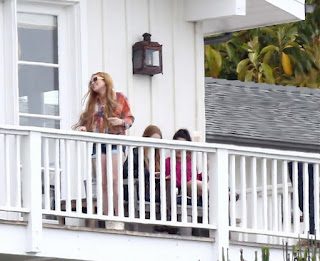Eavesdrop (pronounced eevz-drop)
(1) Secretly to listen to the private conversation of
others; to hear a conversation one is not intended to hear.
(2) To eavesdrop upon.
(3) A concealed aperture through which an occupant of a
building can surreptitiously listen to people talking at an entrance to the
building.
(4) Water that drips from the eaves (also as eavesdrip)
(rare).
(5) The ground around a structure on which such water
drips (rare).
(6) In zoology, to listen for another organism's calls,
so as to exploit them.
Pre 900: From the Middle English evesdrope & evesdripe,
from the Old English yfesdrype (water
dripping from the eaves). The late
Middle English evisdroppyr was apparently
literally “one who stands on the eavesdrops in order to listen to conversations
inside the house”. The ultimate source
may be the Old Norse upsardropi, the
construct being ups (eaves) + -sar- (container) + dropi (a drop). The noun eavesdropper
seems to have come into use in the mid-fifteenth century in the sense of “one
who lurks at walls or windows to overhear what's going on inside.” The same form was adopted for those who “listened
in” even if well away from eaves such as those inside listening through
keyholes and in the security community, it’s also used informally of wiretaps,
listening devices etc. The word
eavesreading was coined on the model of eavesdropping and meant “surreptitiously
to read something”; it’s main use appears to be in spy fiction but the extent
of actual use among spies is of course difficult to estimate. Eavesdrop & eavesdropping are nouns &
verbs, eavesdropped is a verb, eavesdropper is a noun and eavesdroppingly is an
adverb; the noun plural is eavesdrops (the more common probably eavesdroppers).
Eaves (eave the alternative form)
was from the Middle English eves (projecting lower edge of a roof), from the Old
English efes, yfes & ofes (edge of a roof), from the Proto-West
Germanic ubisu (hall), from the Proto-Germanic
ubiswō (and related to the Gothic ubizwa, the Old High German obasa (hall; porch; roof) and perhaps
ultimately from the primitive Indo-European upér
(above; over) from which English ultimately gained “over”. Drop in this context was from the Late Middle
English droppe, from the Middle
English drope (small quantity of
liquid; small or least amount of something; pendant jewel; dripping of a
liquid; a shower; nasal flow, catarrh; speck, spot; blemish; disease causing
spots on the skin), from the Old English dropa
(a drop), from the Proto-West Germanic dropō
(drop of liquid), from the Proto-Germanic drupô
(drop of liquid), from the primitive Indo-European drewb- (to crumble, to grind away).
Long distance eavesdropping: Marketed as an "Extreme Sound Amplifier Professional Bionic Ear Listening Device", Amazon notes the Guppy is ideal for bird watchers, nature lovers and outdoor because it can detect "voice equivalent sounds" at distances up to 75 m (250 feet). Recommended for children aged six and above, it's said to improve children's audiovisual perception, help them explore nature and stimulate their imagination and curiosity. While Amazon doesn’t dwell on the matter, the Guppy could be used as a dual-purpose device.
The noun eavesdrop described (1) the dripping of rain-water
from the eaves of a building (2) the space of ground onto which the water fell and
(3) the container at the end of a pipe or spout which collected the water so it
would be available for other uses such as gardening, cleaning etc. In the ninth century the word was eavesdrip
which in early Modern English evolved to become eavesdrop. The Old English words efes, yfes & ofes (edge
of a roof) from which eaves was derived were all singular but in the way these thing happened in the
Medieval period, the final -s was assumed to indicate a plural (on the basis of
the relationship enjoyed by many other words), thus the emergence of the Middle
English eves which later became eaves, reputedly because with “Eve” appearing
in version of the Bible, the clergy objected to the spelling being used for a
form of drainage which was a remarkable concern for the one they held responsible
for original sin, the downfall of man and the banishment of humanity from the
Garden of Eden.
Stasi eavesdropping ceremony: Stasi officers undertook their duties seriously but there were also office parties where dark good humor was on show. Operatives who have proved outstanding at eavesdropping and eavesreading could be "dubbed" and conferred with a "knighthood" in the Abhörgerät der Ordnung alten (Ancient order of the Wiretap). The Stasi (Ministry for State Security) fulfilled in the German Democratic Republic (the GDR (1949-1990), the old East Germany) a function similar to that of the Soviet KGB and is renowned still as history's most prolific eavesdroppers, their surveillance of written and oral communication so extensive and intrusive that for much of the state's existence, individuals needed to assume their telephone calls were being monitored. The Stasi's (1950-1990) capacity to watch an entire population may soon be exceeded because advances in artificial intelligence (AI) mean it may become possible for the Chinese Communist Party (CCP) literally to listen to every telephone call and read every electronic exchange. In China, it may be that carrier pigeons and typewriters will be made illegal as the CCP moves to ensure there is no communication of which they are unaware.
The noun eavesdrop (also as
eavesdroppe) & eavesdrip had a significance beyond domestic storm-water
management because they were measurements used first in ancient customary law
and later in early English common law as part of what would now be thought a
building or planning code. Under the
doctrine, a land-holder was not permitted to erect a roofed-structure so close
to the boundary of his land that the water which fell from the roof might fall
upon and damage adjacent land. In
customary law, the actual distance was expressed in different ways including “the
extended arm-span of a man” (sometimes the parish priest was nominated) but when
English measures were (more or less) standardized, that became “not lesse than two footes”. Wind and water being what they are, it was
obviously not possible to guarantee absolutely none of the water from one’s
roof would end up on a neighbor’s land so there emerged the common law “right
of drip” which technically created an easement upon the affected land,
restricted to drips from the roof. That
would now be understood under the notion of “reasonableness” and drips would be
held to be reasonable while torrents would not and an order of rectification
could be made to demand the torrents in some way be reduced to drips. This protected the neighbor (the dripee one
might say) from water-damage but also meant that if economic benefit was
derived from even a torrent (such as free agricultural irrigation), the dripor
could not claim for a share of value against the dripee.
The noun eavesdropper was created to refer to “one who
stands within the eavesdrop of a house to overhear conversations inside” and
the first known record of use in the
Presentments at the Sessions of the Borough of Nottingham, 1 October 1487,
written in the Legal Latin of the day:
Juratores Constabulariorum
dicunt, super sacramentum suum, quod Henricus Rowley, de Notingham, in Comitatu
villae Notingham, yoman, die Jovis proximo ante festum Sancti Michaëlis
Archangeli, anno regni Regis Henrici Septimi tertio, ac diversis aliis diebus
et vicibus, communiter et usualiter, apud Notingham praedictam, est communis
evysdropper et vagator in noctibus, in perturbationem populi Domini Regis et
contra pacem suam.
The jurors of the Constables
say, upon their oath, that Henry Rowley, of Nottingham, in the County of the
town of Nottingham, yeoman, on Thursday next before the feast of Saint Michael
the Archangel, in the third year of the reign of King Henry the Seventh, and
upon divers other days and occasions, commonly and usually, at Nottingham
aforesaid, is a common eavesdropper and night-wanderer, to the perturbation of
our Lord the King’s folk and against his peace.
There may in the charge have been the implication Henry
Rowley was more than a quidnunc keeping up with things and may have been “casing
the joint” with nefarious intent but in its pure sense eavesdropper was later
defined in one of the first dictionaries of legal terms; Les Termes de la Ley: or Certaine difficult and obscure Words and
Termes of the Common Lawes and Statutes of this Realme now in vse expounded and
explained (London, 1636), by John Rastell (circa 1475-1536) and his son,
William Rastell (circa 1508-1565):
Euesdroppers are such as
stand vnder walls or windowes by night or day to heare newes, and to carry them
to others to make strife and debate amongst their Neighbors, those are euill
members in the Cōmon-wealth, and therefore by
the Statute of Westminst. (I. cap. 33.) are to bee punished.
Etymologists differ on the matter of sequence. Because the verb eavesdrop is first attested
more than a century after the noun eavesdropper, some maintain former is a
back-formation while others (on the basis of much linguistic
precedent) suggest the very existence of the noun implies the pre-existence of the
verb. Sill the earliest use of the verb
known to be extant was in the writings of the English playwright & poet George
Chapman (circa 1560-1634) in the comedy Sir
Gyles Goosecappe Knight (London, 1606) in which Momford and Lord Furnifall
are in the house and plotting to repair to the gallery outside in order secretly
to listen to the conversation between Clarence and the physician, Doctor Versey:
Momford: Bring
hether the key of the gallerie, me thought I heard the Doctor and my friend.
Lord Furnifall: I
did so sure.
Momford: Peace then
a while my Lord. We will be bold to
evesdroppe.
It’s a forgotten play but Chapman is not because his
translations of the Iliad (1598-1611)
and the Odyssey (1616) rank with the most
highly regarded in English and the evocative beauty of his style influenced
many. It was his work which inspired the Romantic poet John Keats to write the sonnet On First Looking into Chapman’s Homer.
On First Looking into
Chapman's Homer (1816) by John Keats
(1795–1821).

















